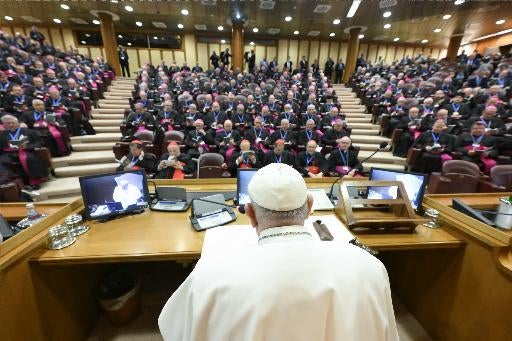Pope apologizes for using ‘homophobic’ slang
VATICAN CITY (CNS) — Pope Francis “never intended to offend or express himself in homophobic terms, and he extends his apologies to those who were offended by the use of a term, reported by others,” that is considered vulgar in Italian, the Vatican press office said.
Six days after Pope Francis had a closed-door meeting with members of the Italian bishops’ conference, a notorious Italian gossip website reported that the pope used a derogatory slang term in Italian to describe some seminaries as being marked by a gay culture.
The website, Dagospia, said the pope used the term May 20 when responding to a bishop’s question about admitting gay men to seminaries as candidates for priesthood.
Leading Italian newspapers La Repubblica and Corriere della Sera said May 27 they confirmed with unnamed Italian bishops that Pope Francis had used the vulgar slang, although Corriere also noted that the pope “sometimes stumbles over somewhat creative Italian without being aware of the nuances.”
Matteo Bruni, director of the Vatican press office, responded late May 28 to repeated requests for comment.
“Pope Francis is aware of articles that recently came out about a conversation he had, behind closed doors, with the bishops of the CEI,” he said, using the Italian acronym for the Italian bishops’ conference.
“As he has had the opportunity to state on several occasions, ‘In the Church there is room for everyone, for everyone! No one is useless, no one is superfluous, there is room for everyone. Just as we are, everyone,'” Bruni said.
La Repubblica had reported that the word the pope used in Italian “made more than one bishop flinch. The man (Pope Francis) is no stranger to verbal intemperance; the meeting was behind closed doors, the conversation informal, but when Pope Francis used that word” there was tension in the room.
While Pope Francis insisted to the bishops that LGBTQ+ Catholics must be accepted in the church and treated with respect, he reportedly said at the meeting that it is better not to accept gay men as candidates for the priesthood. Bruni did not comment on that report.
During a similar closed-door meeting with Italian bishops in 2018, La Repubblica reported, the pope told them if they had “even the slightest doubt” about a gay candidate being able to live a life of celibacy in the seminary and as a priest, “it is better not to let them in.”
In a book-length interview in 2018, Pope Francis had said superiors must be able to help gay candidates prepare for a life of celibacy or encourage them to leave the seminary.
“Homosexuality is a very serious matter, which must be discerned adequately from the beginning with candidates, if it is the case. We must be demanding,” the pope had told Claretian Father Fernando Prado in the book-interview, “The Strength of Vocation: Consecrated Life Today.”
Pope Francis made it clear in the interview that he was talking about homosexual activity among priests and religious who make vows of chastity and celibacy.
“In consecrated life or that of the priesthood, there is no place for this type of affection,” the pope said. “For that reason, the church recommends that persons with this deep-seated tendency not be accepted for ministry or consecrated life.”
A 2005 instruction from the then-Congregation for Catholic Education, approved by Pope Benedict XVI, said the church “cannot admit to the seminary or to holy orders those who practice homosexuality, present deep-seated homosexual tendencies or support the so-called ‘gay culture.'”
Bishops and superiors of religious orders, who are responsible for the final decision about admitting candidates to the priesthood and religious life, have continued to discuss and debate the meaning of “deep-seated homosexual tendencies,” which apparently was what prompted the question to the pope during his meeting with the Italian bishops’ conference.
